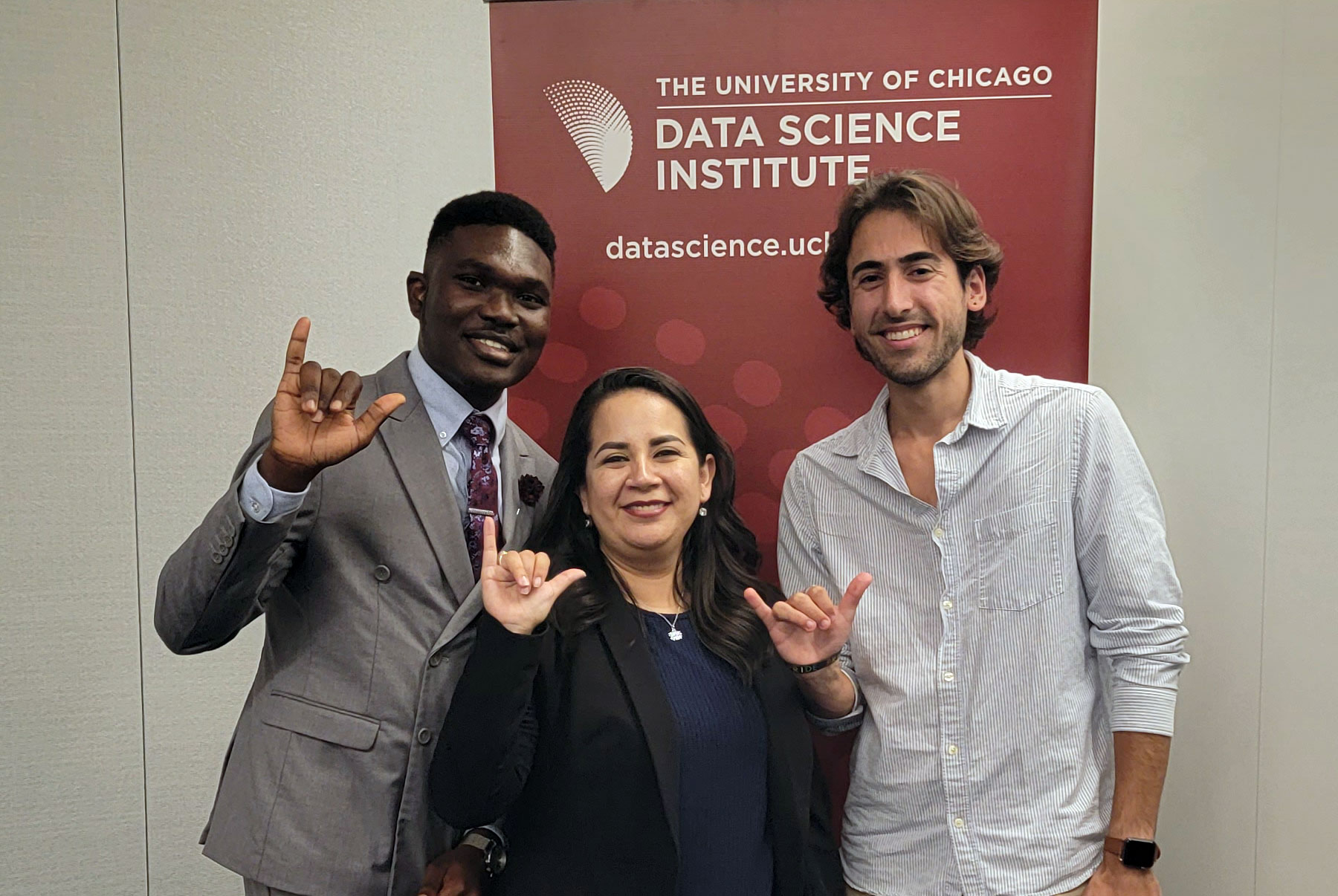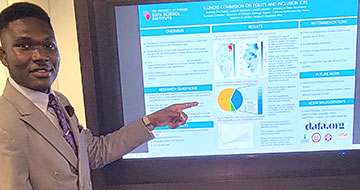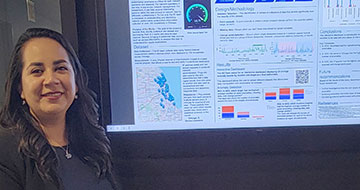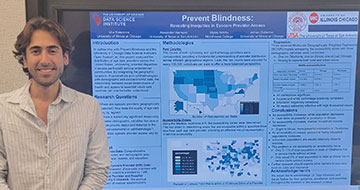Posted on September 11, 2023 by Christopher Reichert

Pictured from left to right: Joseph Jaiyeola, Lizet Casas, Alexander Herrejon. Photo courtesy of Amanda Brown.
Three UTSA students complete selective data science summer lab in Chicago
Over the summer, three UTSA students joined 21 others from around the country in Chicago for a data science Social Impact Summer Experience. The UTSA School of Data Science created this pathway for the students through its participation in a network of diverse institutions in the United States, India and Africa. These institutions are funded by the data.org Capacity Accelerator Network (CAN) to build a workforce of purpose-driven data practitioners worldwide. The UTSA students completed the Data Science for Social Impact (DSSI) program, which was designed and hosted by the University of Chicago, another member institution in CAN. DSSI is a 7-week paid research opportunity for undergraduate and graduate students. For two weeks, the participating students receive intensive training in data science techniques and practices, before spending the remaining five weeks tackling social impact projects on a variety of topics.
Representing UTSA this summer, chosen from nominations from the School of Data Science faculty council members, were Lizet Casas, Alexander Herrejon, and Joseph Jaiyeola. Casas and Jaiyeola are completing their Ph.Ds. at UTSA: Casas in educational leadership and Jaiyeola in applied demography. Both expect to graduate in the spring of 2025. Herrejon graduated from UTSA in May 2023 with an M.A. in geography. With their diverse academic backgrounds, each of the three summer research assistants had different experiences with data science when they first considered the program. Originally receiving his bachelor’s in demography and social statistics from Obafemi Awolowo University in Nigeria, Jaiyeola has always had an interest in applying data science to population studies.
 “I’ve been using data science to do thus far to predict and show problems and use that to give policymakers an idea of what direction to go,” he said.
“I’ve been using data science to do thus far to predict and show problems and use that to give policymakers an idea of what direction to go,” he said.
Although his research focuses on environmental justice, Herrejon has similar experience with data science techniques.
“A lot of times I will use it to try to tease out the correlations,” he said, “to try to understand what underrepresented communities are disproportionately close to point sources of pollution.”
Casas, whose background is in public school finance, had less familiarity with data science, so when it came to applying to the DSSI, it was a bit outside her comfort zone.
“I didn’t know what it was or what I was getting into,” she said. “I thought it would be interesting to put myself in the mix as an education doctoral student and see how it could help me.”
Despite her relative inexperience, Casas wasn’t the only UTSA student uncertainly submitting an application. Herrejon and Jaiyeola both recall questioning whether they should apply or would be accepted. Even after they all arrived in Chicago for the start of the program, Jaiyeola says he felt apprehensive.
“I was a little scared it was going to be something that would throw me off balance when I got there and I’d be the dumbest person in the internship,” he said. “I was optimistic about it though. I think my experience was great; I was glad I was there. I was learning new stuff.”
For the next two weeks, learning was all they would have time for, as all the students received nearly eight hours per day of intensive instruction, first in learning about a programming language known as Python, and later about how to use Python to analyze geospatial data. This classroom time was followed by several hours of homework in the evenings. This rigorous “bootcamp” style training proved to be highly intimidating, Casas says.
“At first it was really scary, being thrown into Python like that. I had no familiarity with it at all. I almost turned around and went right back home,” she said. “But after that first week the group really bonded and it was really helpful in getting me through those seven weeks.”
After those first harrowing weeks, the research assistants formed teams of four to begin working on specific research projects. They would need all the data science skills at their disposal, as the datasets used by the teams sometimes numbered millions of rows of data. Casas’ team was responsible for identifying anomalies in internet performance within the city of Chicago. Herrejon’s was tasked with determining if there were disparities in accessibility to eyecare providers across the states of Illinois and Oklahoma. Jaiyeola and his group explored the equitable distribution of government-awarded contracts to private vendors in the state of Illinois. At the end of the program the teams presented their findings and gave recommendations based on their reports and analyses.
Despite the initial imposter syndrome, the challenges of being so far from home, of once again living in dorms, all three UTSA participants found the DSSI highly rewarding.
“One of my favorite experiences,” Jaiyeola said, “was getting to meet people from different universities with different interests. I liked the fact that people had different levels of experience and we were all able to work together.”
 Herrejon also remarked on the sense of camaraderie.
Herrejon also remarked on the sense of camaraderie.
“I felt like there was always somebody you could go to for help on any problem,” he said. “There was always somebody in the group who was around who was willing to help.”
The support of the CAN also offered valuable opportunities for professional developing, Casas notes.
“I think that partnership of universities that came together to offer this program was also a really great opportunity for us to network at a greater capacity,” she said. “I think that was a really amazing part of the program.”
In addition to the social opportunities, the DSSI also provided attendees with invaluable technical experience, a deeper understanding of their own capabilities, and inspiration to take their studies farther.
“Knowing that I can learn a lot in two weeks in that bootcamp structure, gives me the mindset that I could learn any skill on my own in a few months if I dedicate my time to it,” Jaiyeola said.
Casas believes what she learned over the summer may help her promote data science in high schools, and maybe even teach students to code.
“After having done the program for the seven weeks, it’s something I feel I could probably do if I learn a little bit more about coding and get connected to the right people,” she said. “That’s something I would really be interested in.”
Perhaps the most valuable lesson of all, Jaiyeola reflects, is to take chances.
“I would encourage other students from UTSA to try and apply for stuff like this,” he said. “Most of the time you might not be very confident applying, but you never know: it might be a very good start for your career.”
For more information on the Data Science for Social Impact Summer Experience, visit https://datascience.uchicago.edu/outreach/data-science-for-social-impact-network/summer-experience/.


